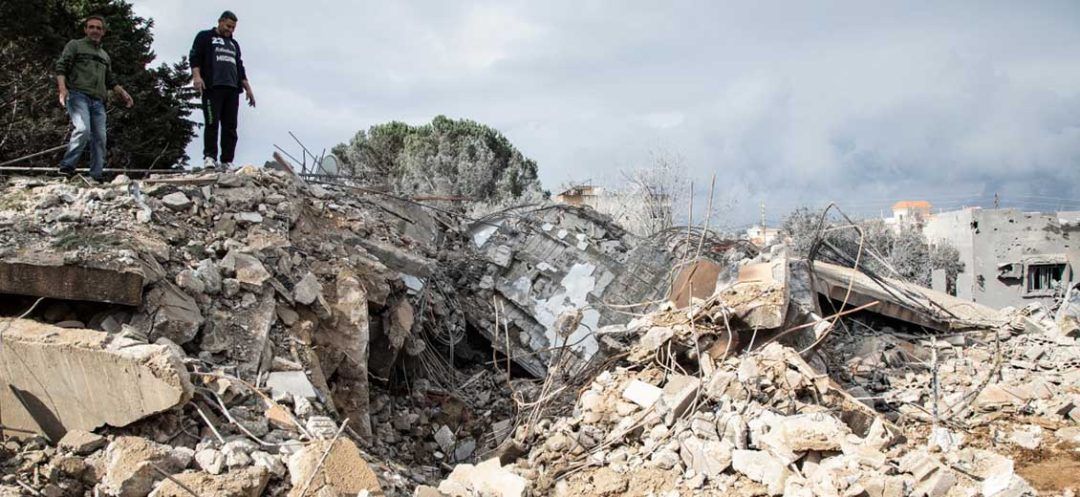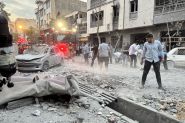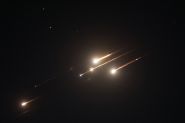- Home
- War in the Middle East
- Retaliation Attacks Intensify Along Southern Border

Cross-border violence continued unabated on Thursday, following the grave developments in South Lebanon a day before, described as the deadliest since October 8.
Israeli airstrikes targeted the village of Blida in the early evening. Initial reports said four people were wounded as a result of the attacks on a residential building and a civilian vehicle.
Israeli artillery bombardments and air raids also targeted several locations, including Aita al-Shaab, Blida, Alma al-Shaab, Tayr Harfa, Hula and the main road from Yarine to Jebbine.
Reports continued on Thursday to assess the damage caused by the Israeli strike on Nabatieh on Wednesday evening, as the exchange of fire between Hezbollah and Israel intensified.
According to the latest figures, at least 12 people were killed, including six women and three children.
In this context, the UN Coordinator for Humanitarian Affairs, Imran Riza, expressed his deep concern at the increasing number of civilian casualties in southern Lebanon. "The rules of war are clear: parties in conflict are obligated to protect civilians, and these rules must be respected. Civilians must not be targeted,” he stressed.
Meanwhile, the Israeli army's Arabic-speaking spoksperson, Avichay Adraee, announced on his X account that a commander of Hezbollah's al-Redwan Force, Ali Mohammad al-Dibs, was killed in the Nabatieh strike, along with his deputy Hassan Ibrahim Issa and another Hezbollah member.
This information has been confirmed by the Israeli army and the pro-Iranian group, which in the last 24 hours has reported the death of 10 of its members, including three in Nabatieh.
Notably, Ali Dibs was reportedly targeted in a drone attack on February 8 in Nabatieh. Israeli military sources indicated his involvement in planning a roadside bomb explosion in northern Israel last March and participation in fighting on the Lebanese-Israeli border since October.
Against the backdrop of the escalation on the Lebanese-Israeli border and the recent expansion of the targeting zone, Israel and Hezbollah traded mutual threats.
Israeli Defense Minister Yoav Gallant informed his American counterpart Lloyd Austin on Thursday that there would be “no leniency in responding to Hezbollah attacks.”
"Our planes in the skies of Beirut carry heavy bombs capable of hitting distant targets," Gallant stated. “The current escalation against Hezbollah is only a tenth of what we can do."
"We can attack up to 50 kilometers deep into Beirut and any other place," he threatened.
The Israeli army radio reported preparations for a war scenario in northern Israel, near the border with Lebanon.
Israel also claimed it attacked dozens of Hezbollah-related targets in the Wadi Slouki region, as well as Hezbollah infrastructure in the Labbouneh area and a military building in Taybeh.
Hezbollah MP Hassan Fadlallah vowed to retaliate for the killing of civilians in Nabatieh, stating that Israel "will pay the price."
In this context, Hezbollah claimed responsibility for firing a dozen Katyusha missiles at the settlement of Kiryat Shmona, as "an initial response to the Nabatieh and Sawan massacres.” According to the Israeli media, the attack was followed by a power cut in a large part of Kiryat Shmona, which also triggered alarm sirens. These also sounded in Aramcha, Zar'it and Shumayra in the Upper Galilee.
Earlier on Thursday, Hezbollah fired three missiles towards the Israeli position of Sammaka (in the Kfarchouba Hills). It also claimed responsibility for attacking Israeli surveillance equipment at the Roueissat al-Alam, Raheb and Marj positions, as well as at the Naqoura maritime site and the Zebdine barracks (Shebaa Farms).
Israeli airstrikes targeted the village of Blida in the early evening. Initial reports said four people were wounded as a result of the attacks on a residential building and a civilian vehicle.
Israeli artillery bombardments and air raids also targeted several locations, including Aita al-Shaab, Blida, Alma al-Shaab, Tayr Harfa, Hula and the main road from Yarine to Jebbine.
Reports continued on Thursday to assess the damage caused by the Israeli strike on Nabatieh on Wednesday evening, as the exchange of fire between Hezbollah and Israel intensified.
According to the latest figures, at least 12 people were killed, including six women and three children.
In this context, the UN Coordinator for Humanitarian Affairs, Imran Riza, expressed his deep concern at the increasing number of civilian casualties in southern Lebanon. "The rules of war are clear: parties in conflict are obligated to protect civilians, and these rules must be respected. Civilians must not be targeted,” he stressed.
Meanwhile, the Israeli army's Arabic-speaking spoksperson, Avichay Adraee, announced on his X account that a commander of Hezbollah's al-Redwan Force, Ali Mohammad al-Dibs, was killed in the Nabatieh strike, along with his deputy Hassan Ibrahim Issa and another Hezbollah member.
This information has been confirmed by the Israeli army and the pro-Iranian group, which in the last 24 hours has reported the death of 10 of its members, including three in Nabatieh.
Notably, Ali Dibs was reportedly targeted in a drone attack on February 8 in Nabatieh. Israeli military sources indicated his involvement in planning a roadside bomb explosion in northern Israel last March and participation in fighting on the Lebanese-Israeli border since October.
Against the backdrop of the escalation on the Lebanese-Israeli border and the recent expansion of the targeting zone, Israel and Hezbollah traded mutual threats.
Israeli Defense Minister Yoav Gallant informed his American counterpart Lloyd Austin on Thursday that there would be “no leniency in responding to Hezbollah attacks.”
"Our planes in the skies of Beirut carry heavy bombs capable of hitting distant targets," Gallant stated. “The current escalation against Hezbollah is only a tenth of what we can do."
"We can attack up to 50 kilometers deep into Beirut and any other place," he threatened.
The Israeli army radio reported preparations for a war scenario in northern Israel, near the border with Lebanon.
Israel also claimed it attacked dozens of Hezbollah-related targets in the Wadi Slouki region, as well as Hezbollah infrastructure in the Labbouneh area and a military building in Taybeh.
Hezbollah MP Hassan Fadlallah vowed to retaliate for the killing of civilians in Nabatieh, stating that Israel "will pay the price."
In this context, Hezbollah claimed responsibility for firing a dozen Katyusha missiles at the settlement of Kiryat Shmona, as "an initial response to the Nabatieh and Sawan massacres.” According to the Israeli media, the attack was followed by a power cut in a large part of Kiryat Shmona, which also triggered alarm sirens. These also sounded in Aramcha, Zar'it and Shumayra in the Upper Galilee.
Earlier on Thursday, Hezbollah fired three missiles towards the Israeli position of Sammaka (in the Kfarchouba Hills). It also claimed responsibility for attacking Israeli surveillance equipment at the Roueissat al-Alam, Raheb and Marj positions, as well as at the Naqoura maritime site and the Zebdine barracks (Shebaa Farms).
Read more




Comments